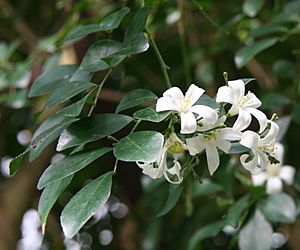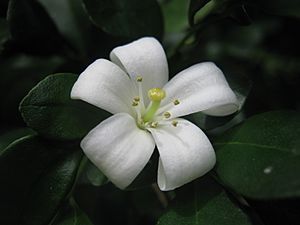Orange jasmine facts for kids
Quick facts for kids Orange jasmine |
|
|---|---|
 |
|
| Foliage and flowers | |
| Scientific classification | |
| Genus: |
Murraya
|
| Species: |
paniculata
|
| Synonyms | |
|
|
Murraya paniculata, commonly known as orange jasmine, orange jessamine, china box or mock orange, is a species of shrub or small tree in the family Rutaceae and is native to South Asia, Southeast Asia and Australia. It has smooth bark, pinnate leaves with up to seven egg-shaped to elliptical leaflets, fragrant white or cream-coloured flowers and oval, orange-red berries containing hairy seeds.
Description
Murraya paniculata is a tree that typically grows to a height of 7 m (23 ft) but often flowers and forms fruit as a shrub, and has smooth pale to whitish bark. It has pinnate leaves up to 170 mm (6.7 in) long with up to seven egg-shaped to elliptical or rhombus-shaped. The leaflets are glossy green and glabrous, 25–100 mm (0.98–3.94 in) long and 12–50 mm (0.47–1.97 in) wide on a petiolule 2–6 mm (0.079–0.236 in) long. The flowers are fragrant and are arranged in loose groups, each flower on a pedicel 1–1.5 mm (0.039–0.059 in) long. There are five (sometimes four) sepals about 1 mm (0.039 in) long and five (sometimes four) white or cream-coloured petals 13–18 mm (0.51–0.71 in) long. Flowering occurs from June to March (in Australia) and the fruit is an oval, glabrous, orange-red berry 12–14 mm (0.47–0.55 in) long containing densely hairy seeds.
Taxonomy
Orange jasmine was first formally described in 1767 by Carl Linnaeus who gave it the name Chalcas paniculata in Mantissa Plantarum. In 1820, William Jack changed the name to Murraya paniculata in his book Descriptions of Malayan Plants [Malayan Miscellanies].
Distribution and habitat
Murraya paniculata grows in rainforest, often as an understorey shrub in vine thickets, including behind beaches. It is native to South and Southeast Asia, China and Australasia, the distribution area extends from Pakistan via India, Sri Lanka and southern China to Taiwan, the Philippines, the Ryūkyū Islands and the Mariana Islands, to the south via Malaysia and Indonesia to New Guinea and parts of Australia. In Australia it is native to the Kimberley region of Western Australia and the northern parts of the Northern Territory and parts of Queensland. The species has been naturalised in other places, sometimes becoming an invasive weed, including on many Pacific islands. In Queensland it is regarded as different from the cultivated form Murraya paniculata 'Exotica' which is regarded as one of the top most invasive plant species in south-east Queensland.
Uses
Murraya paniculata is cultivated as an ornamental tree or hedge because of its hardiness, wide range of soil tolerance (M. paniculata may grow in alkaline, clayey, sandy, acidic and loamy soils), and is suitable for larger hedges. The plant flowers throughout the year and produces small, fragrant flower clusters which attract bees, while the fruits attract small frugivorous birds.
Propagation
The orange jessamine is sexually propagated by its seeds. The fruits are eaten by birds, which then pass the seeds out in their feces. It may also be asexually propagated by softwood cuttings.
Diseases
M. paniculata is vulnerable to soil nematodes, scales, sooty mold and whiteflies.
It is the preferred host to the insect pest Diaphorina citri, the citrus psyllid. This psyllid is the vector for the citrus greening disease.
Gallery
See also
 In Spanish: Murraya paniculata para niños
In Spanish: Murraya paniculata para niños







